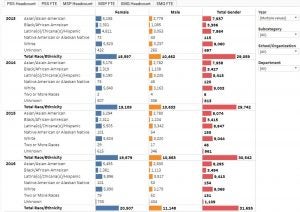Our work can be categorized into a few core functions:
Research
Research & Policy
Research, test, and re-engineer various practices and policies to promote equity, diversity, and inclusion; rationalize, rebuild, and rewrite internal procedures and manuals; conduct R&D and translate academic knowledge into pragmatic “best practices.” Examples include:
- developing equitable and inclusive hiring practices;
- redesigning complaint investigation procedures;
- helping redraft university policies and principles;
- re-engineering student evaluation forms;
- interventions to lift stereotype-threat and counter implicit bias;
- exploring and refining measures of campus climate.
Data Hub
The EDI Data Hub page provides a home for all research and data related to equity, diversity, and inclusion.
- Current and trend information about the gender and racial/ethnic composition of students, faculty, and staff may be viewed via the Data Hub.
Resources
Distribute (scarce) resources to encourage recruitment and retention of faculty who further the Office’s mission; make human capital investments in such faculty; contribute resources to students, staff, and faculty for campus programming and initiatives that further the Office’s mission. Examples include:
- EDI Funding Requests
- Request for Proposal (RFP)-based calls to distribute programming and research funding;
- modest ad-hoc financial support for programming;
- faculty Career Development Awards;
- faculty scholarships for self-development programs.
Training
Prevention & Compliance
Generate legally mandated reports; act as a gatekeeper in faculty searches; investigate rigorously and objectively complaints of discrimination (including those triggered by sexual violence) and issue written findings; train various communities to prevent discrimination and sexual violence from happening in the first place. Examples include:
- annual Affirmative Action / EEO reports;
- monthly Title IX statistics;
- faculty search committee briefings;
- UCLA Recruit faculty searches, approvals, and waivers;
- investigations of discrimination claims by the Discrimination Prevention and Title IX Teams;
- general training programs.
Information
Connect and communicate with internal and external constituencies, through multiple media; provide clear information, prompt responses, informed analyses, and conceptual framings. Information flows both ways, which means that we are also listening and learning with every engagement. Examples include:
- meetings with students, faculty, staff, alums, gov’t officials, regulators;
- attendance at local, regional, and national events;
- announcements, talks, lectures, keynotes;
- media interviews, editorials, blogs, social media;
- “public intellectual” engagements on the merits;
- building a one-stop clearinghouse website for all equity, diversity, inclusion matters.
Advice and Counsel
Advise, collaborate, and coordinate with administrators, deans, department chairs, Equity Advisors, student leaders, and staff leadership on the business of the University that touches upon equity, diversity, and inclusion. Examples include:
- regular meetings with campus administrative leadership;
- regular meetings with campus academic leadership;
- regular meetings with student and staff leadership;
- coordinating steering committees and advisory boards.
Investigations
EDI conducts investigations under the new Civil Rights Office (“CRO”). Investigating all civil rights claims of prohibited conduct on the basis of legally or policy-protected social categories, CRO houses the following investigative units for EDI:
The Discrimination Prevention Office (“DPO”)
DPO investigates claims made by any member of the community (e.g., students, staff, and faculty) that a faculty member discriminated against them. In certain cases, DPO investigates discrimination claims against entities and individuals who are not faculty. DPO also writes policy and holds trainings on decreasing bias and preventing discrimination.
The Title IX Office (“T9”)
Title IX is responsible for UCLA’s compliance with Title IX, including the policies and procedures to prevent and respond to gender discrimination, sexual harassment, and sexual violence. The Title IX Office investigates all such claims filed against any member of the campus community.
The Staff, Diversity & AA/EEO Compliance Office (“SD&C”)
SD&C investigates claims made by any member of the community (e.g., students, staff, faculty, or members of the public) that a staff member has discriminated against or harassed them based upon any protected category. Protected categories include; race, color, national origin, religion, sex, gender, gender expression, gender identity, gender transition status, pregnancy, physical or mental disability, medical condition (cancer-related or genetic characteristics), genetic information (including family medical history), ancestry, marital status, age, sexual orientation, citizenship, or service in the uniformed services, including protected veterans.






